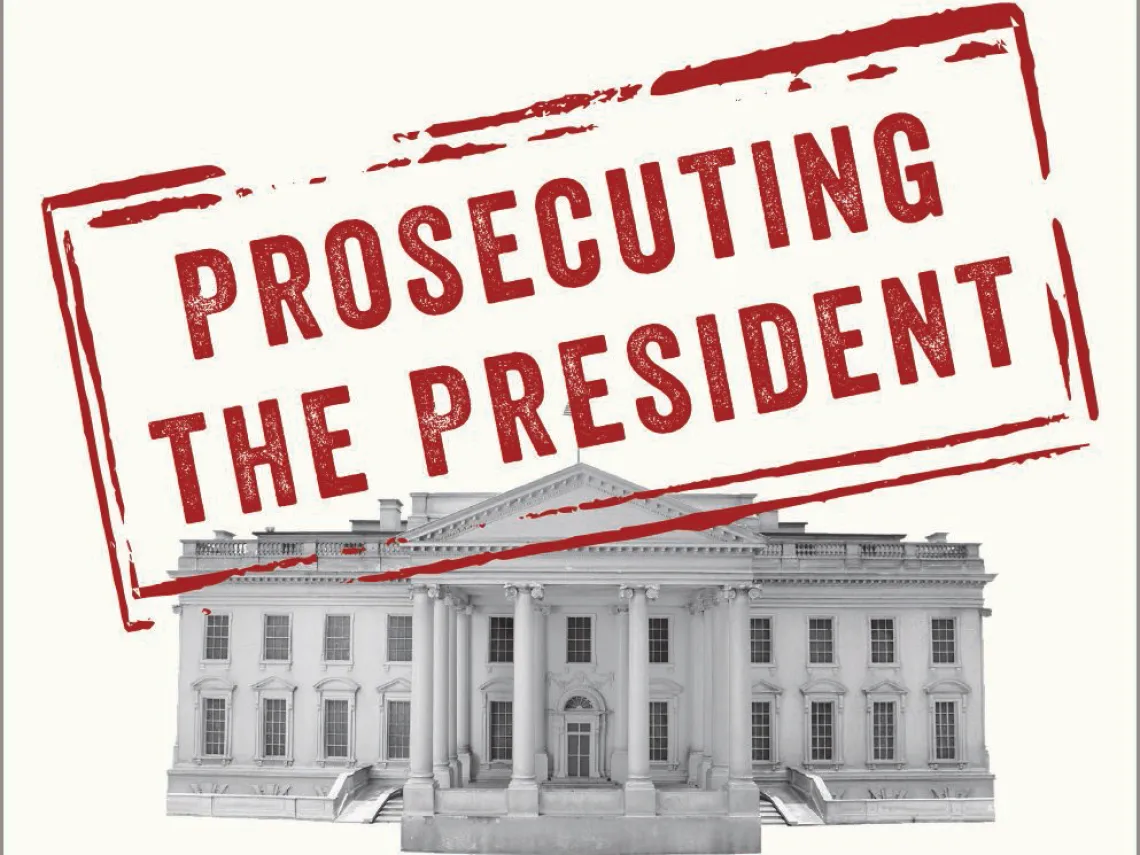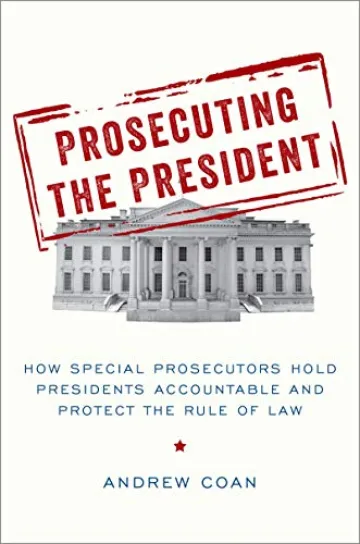Q&A with "Prosecuting the President" Author Andrew Coan
Professor Andrew Coan's new book is "Prosecuting the President: How Special Prosecutors Hold Presidents Accountable and Protect the Rule of Law"

University of Arizona James E. Rogers College of Law Professor Andrew Coan is the author of the new book, "Prosecuting the President: How Special Prosecutors Hold Presidents Accountable and Protect the Rule of Law" (Oxford University Press). In this Q&A he explains the impetus for writing the book, the surprising history of special prosecutors and what may be next in current special prosecutor Robert Mueller's investigation into Russian interference with the 2016 presidential election.
[RELATED: Jan. 10 "Prosecuting the President" Book Discussion with Andrew Coan and Toni Massaro]

What made you want to write this book?
I wrote the book because everyone I knew—and lots of people I didn’t know—were desperate to understand how special prosecutors work. It turned out no one had written a book about them for a general audience. So I decided to do it myself.
Has anyone ever covered special prosecutors in a book before? Why not?
People have written about individual special prosecutor investigations, like Watergate and Iran-Contra, and a few professors have written scholarly books for an academic audience. But no one else has written about special prosecutors in general—their history in American politics and how they work—for a broad readership.
What did you find out about the history of this role that surprised you?
Many people know that Richard Nixon fired the Watergate special prosecutor Archibald Cox, but he was not the first president to do so. Ulysses Grant fired the first special prosecutor in U.S. history when his investigation got too close to Grant’s inner circle. Harry Truman also fired a special prosecutor. Grant and Truman were good presidents and admirable men in many ways, but these episodes represent a major stain on their legacies, especially Grant’s.

"A President who refuses to cooperate with a special prosecutor or actively seeks to thwart an investigation is declaring war on this fundamental American ideal."
What were some of your favorite stories about these early cases that you turned up in your research?
Teapot Dome was one of the most audacious, and colorful, corruption scandals in U.S. history. In the early 1920s, a small group of ambitious and unscrupulous oil barons basically bought the Republican presidential nomination for Warren Harding. In exchange, Harding’s campaign manager promised to sign over the drilling rights to several spectacularly rich federal oil reserves, including one called Teapot Dome that gave the scandal its name. The dirty work fell to Secretary of the Interior Albert Fall, a relic of the old West who would have fit in nicely at the O.K. Corral. Fall signed over the oil rights but was forced from office and ultimately sent to jail by special prosecutors who often had to fund the investigation out of their own pockets.
Did special prosecutors become more famous in the 20th century, or does it simply seem this way due to the way they have been covered by the media?
More special prosecutors have been appointed since 1973 than in all prior years combined, but the institution is hardly a modern innovation. Ulysses S. Grant appointed the first special prosecutor in 1875. Ever since, presidents of both parties have appointed special prosecutors to neutralize political scandals and signal their commitment to the rule of law. There was a bit of a lull in the mid-20th century.
Is there anything different about the way the Robert Mueller investigation is unfolding, when you compare it to other investigations in the past?
Thus far, the Mueller investigation has been unusually leak-proof, unusually short, and unusually efficient in investigating an incredibly complex set of issues. Of course, much of the information necessary to answer this question is not yet in the public domain.
Are there any parallels between previous special prosecutor investigations and the Mueller investigation today?
The most important parallel is that political pressure has forced President Trump to put up with Mueller’s investigation, basically against his will. It is pretty remarkable if you think about it. Trump loves to violate longstanding norms. And he clearly has the power to fire Robert Mueller if he thinks he can get away with it. But Mueller still has a job, even as his investigation appears to close in on the president and his closest advisors. Of course, we don’t know what that investigation will turn up. But this is exactly how the Watergate special prosecutors managed to bring down Richard Nixon.
Are there right ways and wrong ways for presidents to handle or manage being investigated by a special prosecutor?
In a word, yes. Special prosecutors are human embodiments of the principle that no one—not even the president—is above the law. A president who refuses to cooperate with a special prosecutor or actively seeks to thwart an investigation is declaring war on this fundamental American ideal. Of course, presidents are also entitled to defend themselves. But they must not prevent a special prosecutor from conducting a full and fair investigation. A president who does so probably has something to hide.
Why can the special prosecutor be fired by the president at any time? Isn’t that counterintuitive?
It is counterintuitive, it hasn’t always been that way, and many other countries take a different approach. On the other hand, the American system isn’t entirely crazy. The basic idea behind it is this: Special prosecutors, no less than presidents, can abuse their power. To prevent this, they must be accountable to someone, preferably an elected official. As the head of the federal executive branch, the president is the logical choice—and arguably the only constitutional one. If he exercises that power corruptly or capriciously, special prosecutors have no legal remedy. But they are not unprotected. The president must ultimately answer to the American people. This has proved a surprisingly powerful deterrent, though also a fragile one.
How can the special prosecutor do his or her job without even an office set aside for the staff? Why would anyone want this job?
It is not easy to get an office up and running from scratch. And right from the outset, special prosecutors are under intense pressure to wrap up their investigations quickly. But it’s also a chance to be a part of history. And most special prosecutors have been motivated by a high sense of public duty.
What happens if a special prosecutor is fired by the president?
That depends. If this decision provokes a major public or congressional backlash, the president might feel compelled to reverse course—or, more likely, appoint another credible and independent special prosecutor. That’s what happened when Richard Nixon fired the first Watergate special prosecutor Archibald Cox. If the president refuses to back down, Congress can begin its own investigation, calling the special prosecutor and his staff as witnesses. There are many contingencies. But these are two of the most likely scenarios.
What happens if he or she doesn’t find anything worth noting in the course of their work?
Under current law, special prosecutors are required to submit a report to the attorney general explaining their decision to bring charges or not. This report is confidential and the attorney general gets to decide whether to publish it or pass it along to Congress. But in the case of Robert Mueller’s investigation, the administration would face substantial pressure to release the report and the House of Representatives would probably try to obtain it via subpoena. Robert Mueller has also detailed many of his findings in court filings that are presently under seal to protect his ongoing investigation. When that investigation is no longer ongoing, many of those filings will presumably be unsealed and open to public scrutiny.
If an investigation turns up evidence that the president has broken the law, what happens then?
It is not entirely clear. Most likely, if Robert Mueller uncovers such evidence, he would include it in his report to the attorney general. It would then be up to the AG to decide whether to release the report publicly or pass it along to Congress for possible use in impeachment proceedings. A special prosecutor probably does not possess the power to indict a sitting president, though a president certainly can be indicted after leaving office, assuming that the statute of limitations has not lapsed.
What is the one thing you hope readers of the book will remember?
Special prosecutors can do much to hold presidents accountable, but they are incapable of saving us from ourselves. Ultimately, only the American people can decide whether the president is above the law.
MEDIA COVERAGE OF COAN AND "PROSECUTING THE PRESIDENT"
"New Book Looks at History of Special Prosecutors," MSNBC Morning Joe
"History Suggests Trump can Fire Mueller without Paying a Price," New York Post
"What Happens if Mueller Comes Up Empty," CNN
"William Barr's Memo on the Mueller Probe is Baseless and Dangerous," Washington Post
"President Grant Fired His Special Prosecutor, but Nixon Paid a Big Price," San Francisco Chronicle
"Now It's Up to the Public," The Atlantic
